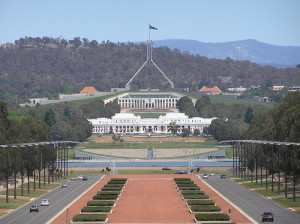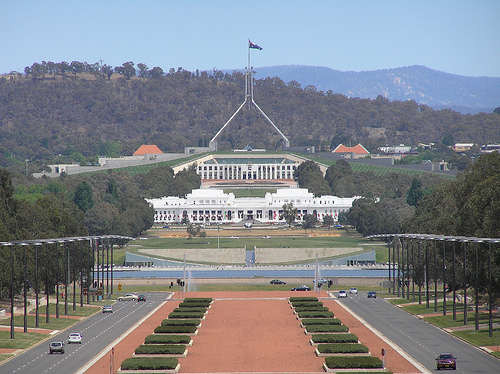Originally published January 25, 2016.
Australia Day has, as usual, seen the predictable conga line of left-wing activists calling for the renaming of Australia Day to “Invasion Day,” the plans to burn our flag, and the call for a Republic. Such antics have proven worthwhile sport for The XYZ, and given us the opportunity to present some serious arguments for why we should be proud of our country, our history and our culture.
I would like to take the opportunity to present my own planned change to the status quo, one which would be more beneficial than the usual socialist fantasies which entertain us this time each year. I would like to explore what Australia’s government system would look like, ideally, to my eyes.
I envisage a government that is small, a little lacklustre, and out of the way.
Small
By small, I mean tiny. The four largest government departments are Defence, Foreign Affairs and Trade, Veteran’s Affairs, and Roads. Comparing the size of these departments to the rest is like comparing the gas giants of Jupiter, Saturn, Uranus and Neptune to the small, rocky planets of our solar system.

Federal and State bureaucracies for health, social services and education all fit into buildings roughly the size of large suburban houses, while their duties have been delegated directly to schools, hospitals and charities where decisions can be made by people who understand more intimately the needs of their individual communities.
When running for office, candidates compete on the basis of how much funding they can slash, and creative new ways to reduce legislation. Repeal Days are held once a month. Elected representatives and paid bureaucrats see their second most important task, after reducing the number of laws and regulations, as enforcing those which are deemed important enough to remain. With less laws, and the culture it encourages, with an emphasis on personal responsibility and eschewing legalism, there are fewer lawyers, demand drops, and the legal system becomes more affordable for the ordinary consumer.
Lacklustre
After the initial flurry and excitement of taking the proverbial and literal chainsaw to most of government, there isn’t really that much to do. Grand proposals for nation shaping legislation, such as the centralisation of a key service vital to the “wellness” of the nation, generally grind to a halt after a few months, as all involved realise they would rather go outside to kick the footy.
In such an environment, politicians and bureaucrats realise that the best way to justify their jobs isn’t to find new areas of people’s private lives that they can regulate, but to slow down the groundwork for repealing current legislation. Obviously, this is not ideal, but it would be a huge improvement.
Lunch time generally extends anywhere from 3 hours to the entire afternoon. Politicians and staff rarely turn up before 10am, and if you manage to contact them after 2, they are invariably drunk. Given that most areas of government have managed to reduce running costs from the billions to the millions, the general citizenry, while not wholly approving, is prepared to look the other way. Work for the dole programs are extended to work experience in government, to give youth and the long-term unemployed a basic grounding in administration, public speaking and poker. One externality of all this is that Canberra finally sheds its reputation as a dull backwater and becomes the capital city for Party! Party! Party!
Of course, in the event of a national emergency, such as invasion or natural disaster, the arms of government can quickly and efficiently stir as people relish the opportunity to actually do something. Once it is all over, government can get back to doing what it does best – quite literally, getting out of the way.
Out of the way
One of the most important things to understand about a government which gets out of the way isn’t that it would not solve all our problems. Actually, this is precisely the point – it would not be a utopia. People would still get sick, have car accidents, lose their jobs, break the law, take drugs, disrespect their parents, be cruel to animals. But we wouldn’t look to government to find a solution, and would instead take personal responsibility and work within our communities to find solutions to problems which affected individuals.

Although we would still see economic downturn from time to time, with almost no restrictions, business in Australia would boom. The infrastructure gap we currently experience would quickly close, as it became cheaper for private companies to build that railroad, expand that port, build that liquid thorium reactor to power the desalination plant which brings permanent green to our red centre, and develop that reusable rocket to transport millions of people into outer space. With the same principle applied to every other aspect of our lives, individuals could make decisions on factors which affected them directly.
Of course, there would still be socialists, whingers, SJW’s, do-gooders and wowsers. But they would be relegated well and truly to the political sidelines, and the dark corners of the internet, by a society far more interested in celebrating joy, being productive, creative, or just going to the beach. The biggest economic division, politically speaking, would be between those who want a flat tax, and those who want to eliminate income tax altogether.
We can have a government like this, and a country like this, if we want it.
If you want government to get out of the way, if you want to pay less tax, if you want to waste as little of your own time as possible complying with regulations, if you want affordable access to the legal system; demand it from your government. Demand it from your elected representatives. And if they don’t deliver it, make them pay at the ballot box.
Photo by Brenden Ashton 










